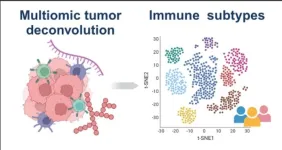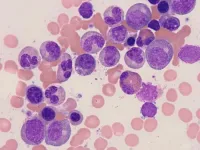(Press-News.org) More than one hundred key genes linked to DNA damage have been uncovered through systematic screening of nearly 1,000 genetically modified mouse lines, in a new study published today (14 February) in Nature.
The work provides insights into cancer progression and neurodegenerative diseases as well as a potential therapeutic avenue in the form of a protein inhibitor.
The genome contains all the genes and genetic material within an organism's cells. When the genome is stable, cells can accurately replicate and divide, passing on correct genetic information to the next generation of cells. Despite its significance, little is understood about the genetic factors governing genome stability, protection, repair, and the prevention of DNA damage1.
In this new study, researchers from the Wellcome Sanger Institute, and their collaborators at the UK Dementia Research Institute at the University of Cambridge, set out to better understand the biology of cellular health and identify genes key to maintaining genome stability.
Using a set of genetically modified mouse lines, the team identified 145 genes that play key roles in either increasing or decreasing the formation of abnormal micronuclei structures2. These structures indicate genomic instability and DNA damage, and are common hallmarks of ageing and diseases.
The most dramatic increases in genomic instability were seen when the researchers knocked out the gene DSCC1, increasing abnormal micronuclei formation five-fold. Mice lacking this gene mirrored characteristics akin to human patients with cohesinopathy disorders3, further emphasising the relevance of this research to human health.
Using CRISPR screening, researchers showed this effect triggered by DSCC1 loss could be partially reversed through inhibiting protein SIRT14. This offers a highly promising avenue for the development of new therapies.
The findings help shed light on genetic factors influencing the health of human genomes over a lifespan and disease development.
Professor Gabriel Balmus, senior author of the study at the UK Dementia Research Institute at the University of Cambridge, formerly at the Wellcome Sanger Institute, said: “Continued exploration on genomic instability is vital to develop tailored treatments that tackle the root genetic causes, with the goal of improving outcomes and the overall quality of life for individuals across various conditions. Our study underscores the potential of SIRT inhibitors as a therapeutic pathway for cohesinopathies and other genomic disorders. It suggests that early intervention, specifically targeting SIRT1, could help mitigate the biological changes linked to genomic instability before they progress.”
Dr David Adams, first author of the study at the Wellcome Sanger Institute, said: “Genomic stability is central to the health of cells, influencing a spectrum of diseases from cancer to neurodegeneration, yet this has been a relatively underexplored area of research. This work, of 15 years in the making, exemplifies what can be learned from large-scale, unbiased genetic screening. The 145 identified genes, especially those tied to human disease, offer promising targets for developing new therapies for genome instability-driven diseases like cancer and neurodevelopmental disorders.”
ENDS
Contact details:
Jelena Pupavac
Press Office
Wellcome Sanger Institute
Cambridge, CB10 1SA
Email: press.office@sanger.ac.uk
Notes to Editors:
Various sources of damage to the genome can include radiation, chemical exposure, and errors during DNA replication or repair processes.
Micronuclei are small abnormal structures, often referred to as "mutation factories", containing misplaced genetic material, that should otherwise be in the cell nucleus. Their presence signifies an increased risk of diseases like cancer and developmental disorders.
Cohesinopathy disorders are a group of genetic conditions resulting from dysfunctional cohesin proteins, essential for proper chromosome organisation and segregation during cell division. This can lead to a spectrum of developmental abnormalities, intellectual disability, distinctive facial features and growth retardation.
When the SIRT1 protein was suppressed, DNA damage reduced and they could rescue the negative effects of DSCC1 loss associated with cohesion disruption. This action was via restoring chemical levels of a protein called SMC3. END
Key genes linked to DNA damage and human disease uncovered
Scientists unveil 145 genes vital for genome health, and possible strategies to curb progression of human genomic disorders
2024-02-14
ELSE PRESS RELEASES FROM THIS DATE:
New study finds Black birthing people prefer Black obstetric providers due to experiences of discrimination and fear of dying during pregnancy or childbirth
2024-02-14
UNDER EMBARGO UNTIL: Feb. 14, 2024, 11:45 AM EST
Media Contacts: Karen Addis, APR, karen@addispr.com, +1 (301) 787-2394; Kerri Wade, MPA, kwade@smfm.org, +1 (202) 236-1780
National Harbor, Md. -- Data from the Centers for Disease Control and Prevention demonstrate that Black women in the United States are three times more likely to die from a pregnancy-related cause than are white women. Health disparities among people of color are the result of broader social and economic inequities rooted in racism and discrimination.
In a new study to be presented today at the Society for Maternal-Fetal Medicine’s (SMFM) annual meeting, The Pregnancy Meeting™, researchers ...
SLAS Life Sciences and Technology Awards announced
2024-02-14
Boston, MA (February 13, 2024) – Science and technology awards were announced during the SLAS2024 International Conference and Exhibition, the annual flagship event of the Society for Laboratory Automation and Screening, which attracted a record-setting 7500 attendees and 400 exhibitors. Each year SLAS recognizes several exceptional presenters and exhibitors who represent the best of the Society’s programs and mission. The complete list of the 2024 award descriptions and winners follow:
SLAS Innovation Award
The most ...
Is the Amazon forest approaching a tipping point?
2024-02-14
Global warming may be interacting with regional rainfall and deforestation to accelerate forest loss in the Amazon, pushing it towards partial or total collapse.
Research published today [14 February 2024] in Nature, has identified the potential thresholds of these stressors, showing where their combined effects could produce a ‘tipping point’ - in which the forest is so fragile that just a small disturbance could cause an abrupt shift in the state of the ecosystem.
The study was led by the Federal University ...
Cognitive symptoms of post–COVID-19 condition and daily functioning
2024-02-14
About The Study: The findings of this survey study of U.S. adults suggest that cognitive symptoms are common among individuals with post–COVID-19 condition and associated with greater self-reported functional impairment, lesser likelihood of full-time employment, and greater depressive symptom severity. Screening for and addressing cognitive symptoms is an important component of the public health response to post–COVID-19 condition.
Authors: Roy H. Perlis, M.D., M.Sc., of Massachusetts General Hospital in Boston, is the corresponding ...
Prescription opioid exposure during pregnancy and risk of spontaneous preterm delivery
2024-02-14
About The Study: In this study of 251,000 pregnant patients with Tennessee Medicaid and without opioid use disorder, a positive association was found between total prescription opioid dose dispensed and the odds of spontaneous preterm birth. These findings support guidance to minimize opioid exposure during pregnancy and prescribe the lowest dose necessary.
Authors: Sarah S. Osmundson, M.D., M.S., of the Vanderbilt University Medical Center in Nashville, is the corresponding author.
To access the embargoed study: Visit our For The Media ...
Researchers characterize the immune landscape in cancer
2024-02-14
New York, NY [February 14, 2024]—Researchers from the Icahn School of Medicine at Mount Sinai, in collaboration with the Clinical Proteomic Tumor Analysis Consortium of the National Institutes of Health, The University of Texas MD Anderson Cancer Center, Sylvester Comprehensive Cancer Center at the University of Miami Miller School of Medicine, and others, have unveiled a detailed understanding of immune responses in cancer, marking a significant development in the field. The findings were published in the February ...
Altermagnetism proves its place on the magnetic family tree
2024-02-14
There is now a new addition to the magnetic family: thanks to experiments at the Swiss Light Source SLS, researchers have proved the existence of altermagnetism. The experimental discovery of this new branch of magnetism is reported in Nature and signifies new fundamental physics, with major implications for spintronics.
Magnetism is a lot more than just things that stick to the fridge. This understanding came with the discovery of antiferromagnets nearly a century ago. Since then, the family of magnetic materials has been divided into two fundamental phases: the ferromagnetic branch known for several millennia and the antiferromagnetic branch. The experimental proof of a third branch of ...
A “quantum leap” at room temperature
2024-02-14
In the realm of quantum mechanics, the ability to observe and control quantum phenomena at room temperature has long been elusive, especially on a large or “macroscopic” scale. Traditionally, such observations have been confined to environments near absolute zero, where quantum effects are easier to detect. But the requirement for extreme cold has been a major hurdle, limiting practical applications of quantum technologies.
Now, a study led by Tobias J. Kippenberg and Nils Johan Engelsen at EPFL, redefines the boundaries of what’s ...
Amazon rainforest at the threshold: loss of forest worsens climate change
2024-02-14
The Amazon rainforest could approach a tipping point, which could lead to a large-scale collapse with serious implications for the global climate system. A new Nature study by an international research team including scientists from the Potsdam Institute for Climate Impact research (PIK) reveals that up to 47 percent of the Amazonian forest is threatened and identifies climatic and land-use thresholds that should not be breached to keep the Amazon resilient.
“The Southeastern Amazon has already shifted from a carbon sink to a source –meaning that the current amount of human pressure is too high for the region to maintain its status as a rainforest over the long term. But ...
Researchers uncover mechanisms behind enigmatic shapes of nuclei
2024-02-14
Nearly 150 years ago, scientists discovered that specialized blood cells serve a vital role in immune system protection against infection and illness.
Certain groups of these white blood cells, now known as neutrophils, feature a nucleus that is structured strikingly different than most nuclei. The majority of cells feature round- or oval-shaped nuclei that are rigid, but neutrophils differ in that their nuclei adopt multiple lobular structures akin to that of flower petal arrangements.
These unique nuclear shapes permit neutrophils to travel all over the body to identify and combat invading ...
LAST 30 PRESS RELEASES:
Heart attack deaths rose between 2011 and 2022 among adults younger than age 55
Will melting glaciers slow climate change? A prevailing theory is on shaky ground
New treatment may dramatically improve survival for those with deadly brain cancer
Here we grow: chondrocytes’ behavior reveals novel targets for bone growth disorders
Leaping puddles create new rules for water physics
Scientists identify key protein that stops malaria parasite growth
Wildfire smoke linked to rise in violent assaults, new 11-year study finds
New technology could use sunlight to break down ‘forever chemicals’
Green hydrogen without forever chemicals and iridium
Billion-DKK grant for research in green transformation of the built environment
For solar power to truly provide affordable energy access, we need to deploy it better
Middle-aged men are most vulnerable to faster aging due to ‘forever chemicals’
Starving cancer: Nutrient deprivation effects on synovial sarcoma
Speaking from the heart: Study identifies key concerns of parenting with an early-onset cardiovascular condition
From the Late Bronze Age to today - Old Irish Goat carries 3,000 years of Irish history
Emerging class of antibiotics to tackle global tuberculosis crisis
Researchers create distortion-resistant energy materials to improve lithium-ion batteries
Scientists create the most detailed molecular map to date of the developing Down syndrome brain
Nutrient uptake gets to the root of roots
Aspirin not a quick fix for preventing bowel cancer
HPV vaccination provides “sustained protection” against cervical cancer
Many post-authorization studies fail to comply with public disclosure rules
GLP-1 drugs combined with healthy lifestyle habits linked with reduced cardiovascular risk among diabetes patients
Solved: New analysis of Apollo Moon samples finally settles debate about lunar magnetic field
University of Birmingham to host national computing center
Play nicely: Children who are not friends connect better through play when given a goal
Surviving the extreme temperatures of the climate crisis calls for a revolution in home and building design
The wild can be ‘death trap’ for rescued animals
New research: Nighttime road traffic noise stresses the heart and blood vessels
Meningococcal B vaccination does not reduce gonorrhoea, trial results show
[Press-News.org] Key genes linked to DNA damage and human disease uncoveredScientists unveil 145 genes vital for genome health, and possible strategies to curb progression of human genomic disorders




